formerly eScholarship Editions


|
|
|
|
Your request for similar items found 20 book(s). | Modify Search | Displaying 1 - 20 of 20 book(s) | |
| 1. | 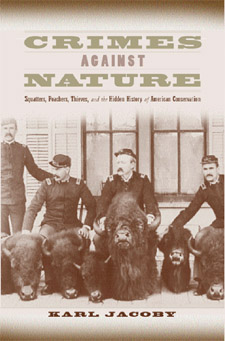 | Title: Crimes against nature: squatters, poachers, thieves, and the hidden history of American conservation Author: Jacoby, Karl 1965- Published: University of California Press, 2001 Subjects: History | United States History | Natural History Publisher's Description: Crimes against Nature reveals the hidden history behind three of the nation's first parklands: the Adirondacks, Yellowstone, and the Grand Canyon. Focusing on the impact that conservation in these areas had on rural people, Karl Jacoby traces the effect of criminalizing such traditional practices as hunting and fishing, foraging, and timber cutting in these newly created parks. Jacoby reassesses the nature of these "crimes" and provides a rich portrait of rural people and their relationship with the natural world in the late nineteenth and early twentieth centuries. This engagingly written study demonstrates the important ways in which class has influenced environmental history. [brief] Similar Items |
| 2. |  | Title: Spectacular nature: corporate culture and the Sea World experience Author: Davis, Susan G 1953- Published: University of California Press, 1997 Subjects: Environmental Studies | Popular Culture | American Studies | Sociology Publisher's Description: This is the story of Sea World, a theme park where the wonders of nature are performed, marketed, and sold. With its trademark star, Shamu the killer whale - as well as performing dolphins, pettable sting rays, and reproductions of pristine natural worlds - the park represents a careful coordination of shows, dioramas, rides, and concessions built around the theme of ocean life. Susan Davis analyzes the Sea World experience and the forces that produce it: the theme park industry; Southern California tourism; the privatization of urban space; and the increasing integration of advertising, entertainment, and education. The result is an engaging exploration of the role played by images of nature and animals in contemporary commercial culture, and a precise account of how Sea World and its parent corporation, Anheuser-Busch, succeed. Davis argues that Sea World builds its vision of nature around customers' worries and concerns about the environment, family relations, and education.While Davis shows the many ways that Sea World monitors its audience and manipulates animals and landscapes to manufacture pleasure, she also explains the contradictions facing the enterprise in its campaign for a positive public identity. Shifting popular attitudes, animal rights activists, and environmental laws all pose practical and public relations challenges to the theme park. Davis confronts the park's vast operations with impressive insight and originality, revealing Sea World as both an industrial product and a phenomenon typical of contemporary American culture. Spectacular Nature opens an intriguing field of inquiry: the role of commercial entertainment in shaping public understandings of the environment and environmental problems. [brief] Similar Items |
| 3. | 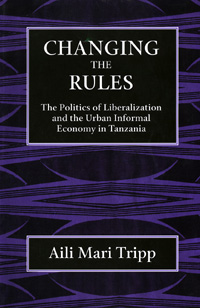 | Title: Changing the rules: the politics of liberalization and the urban informal economy in Tanzania Author: Tripp, Aili Mari Published: University of California Press, 1997 Subjects: Politics | Anthropology | African Studies | Economics and Business Publisher's Description: How are people in one of Africa's largest cities, Dar es Salaam, capable of surviving day to day when the downward decline of Tanzania's economy has become so pronounced that even high-ranking state employees receive among the lowest incomes in the country? In this impressively researched and highly original study, Aili Mari Tripp shows how the people of Dar es Salaam, through creativity and considerable ingenuity, supply for themselves the various goods and services that the government can no longer provide. With the growth of an informal economy, they have demonstrated resistance to state control, resulting in broad political, economic and social transformations within Tanzania. Moreover, the unprecedented participation of women in informal economic activities has had a profound effect on gender relations.Tripp incorporates in-depth interviews and a field survey conducted at the household and micro-enterprise level in examining the influence and impact of the urban informal economy on Tanzanian society. This informal sector encompasses the enterprises of masons, cooks, cobblers, and tailors; a dizzying myriad of market vendors; even educators and doctors. Tripp shows how the urban informal economy challenges state-defined bases of social justice with alternative notions of economic equity. Her work is an essential contribution to the study of African politics and state-society relations. [brief] Similar Items |
| 4. | 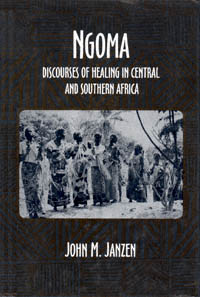 | Title: Ngoma: discourses of healing in central and southern Africa Author: Janzen, John M Published: University of California Press, 1992 Subjects: Anthropology | African Studies | Medical Anthropology Publisher's Description: Ngoma , in Bantu, means drum, song, performance, and healing cult or association. A widespread form of ritual healing in Central and Southern Africa, ngoma is fully investigated here for the first time and interpreted in a contemporary context. John Janzen's daring study incorporates drumming and spirit possession into a broader, institutional profile that emphasizes the varieties of knowledge and social forms and also the common elements of "doing ngoma ."Drawing on his recent field research in Kinshasa, Dar-es-Salaam, Mbabane, and Capetown, Janzen reveals how ngoma transcends national and social boundaries. Spoken and sung discourses about affliction, extended counseling, reorientation of the self or household, and the creation of networks that link the afflicted, their kin, and their healers are all central to ngoma - and familiar to Western self-help institutions as well. Students of African healing and also those interested in the comparative and historical study of medicine, religion, and music will find Ngoma a valuable and thought-provoking book. [brief] Similar Items |
| 5. | 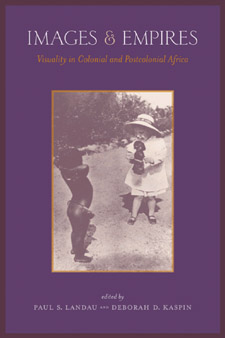 | Title: Images and empires: visuality in colonial and postcolonial Africa Author: Landau, Paul Stuart 1962- Published: University of California Press, 2002 Subjects: Anthropology | African Studies | Art History | Cultural Anthropology | History Publisher's Description: Figurative images have long played a critical, if largely unexamined, role in Africa - mediating relationships between the colonizer and the colonized, the state and the individual, and the global and the local. This pivotal volume considers the meaning and power of images in African history and culture. Paul S. Landau and Deborah Kaspin have assembled a wide-ranging collection of essays dealing with specific visual forms, including monuments, cinema, cartoons, domestic and professional photography, body art, world fairs, and museum exhibits. The contributors, experts in a number of disciplines, discuss various modes of visuality in Africa and of Africa, investigating the interplay of visual images with personal identity, class, gender, politics, and wealth. Integral to the argument of the book are over seventy contextualized illustrations. Africans saw foreigners in margarine wrappers, Tintin cartoons, circus posters, and Hollywood movies; westerners gleaned impressions of Africans from colonial exhibitions, Tarzan films, and naturalist magazines. The authors provide concrete examples of the construction of Africa's image in the modern world. They reveal how imperial iconographies sought to understand, deny, control, or transform authority, as well as the astonishing complexity and hybridity of visual communication within Africa itself. [brief] Similar Items |
| 6. |  | Title: Popular music and national culture in Israel Author: Regev, Motti Published: University of California Press, 2004 Subjects: Music | Ethnomusicology | Middle Eastern Studies | Popular Culture | Jewish Studies Publisher's Description: A unique Israeli national culture - indeed, the very nature of "Israeliness" - remains a matter of debate, a struggle to blend vying memories and backgrounds, ideologies and wills. Identifying popular music as an important site in this wider cultural endeavor, this book focuses on the three major popular music cultures that are proving instrumental in attempts to invent Israeliness: the invented folk song repertoire known as Shirei Eretz Israel; the contemporary, global-cosmopolitan Israeli rock; and the ethnic-oriental musica mizrahit. The result is the first ever comprehensive study of popular music in Israel. Motti Regev, a sociologist, and Edwin Seroussi, an ethnomusicologist, approach their subject from alternative perspectives, producing a truly interdisciplinary, sociocultural account of music as a feature and a force in the shaping of Israeliness. A major ethnographic undertaking, describing and analyzing the particular history, characteristics, and practices of each music culture, Popular Music and National Culture in Israel maps not only the complex field of Israeli popular music but also Israeli culture in general. [brief] Similar Items |
| 7. |  | Title: Historical destiny and national socialism in Heidegger's "Being and time" Author: Fritsche, Johannes Published: University of California Press, 1999 Subjects: Philosophy | German Studies | Intellectual History Publisher's Description: There has been much debate over the relationship of Heidegger's philosophy - in particular his book Being and Time - to his practical involvement with National Socialism. Yet the question has never been addressed through a comparison of Being and Time with other texts on history and politics written at the time. Johannes Fritsche does this, providing a detailed interpretation of the relevant passages in Being and Time - especially sections 72-77 on fate, community, and society. He analyzes for comparison two other authors who explicitly regarded themselves as rightists - Adolf Hitler ( Mein Kampf ) and Max Scheler ( Formalism in Ethics and other writings) - and two authors on the left - Georg Lukács ( History and Class Consciousness ) and Paul Tillich ( The Socialist Decision ).Fritsche concludes that Being and Time is a brilliant summary of right-wing politics in general, which proposes the destruction of liberal society in order to regenerate an idealized community. In addition, Heidegger rejects positions on the right, such as Scheler's, that enabled their authors to distance themselves from the most extreme political rightists, and thus he paves the way for National Socialism. Being and Time , Fritsche demonstrates, must be seen as a clear case for the National Socialists and their project of revitalization of the Volksgemeinschaft , the community of the people. [brief] Similar Items |
| 8. | 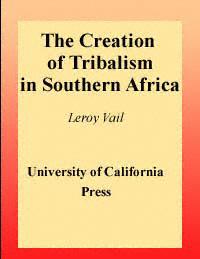 | Title: The Creation of tribalism in Southern Africa Author: Vail, Leroy Published: University of California Press, 1989 Subjects: History | African History | African Studies | Ethnic Studies Publisher's Description: Despite a quarter century of "nation building," most African states are still driven by ethnic particularism - commonly known as "tribalism." The stubborn persistence of tribal ideologies despite the profound changes associated with modernization has puzzled scholars and African leaders alike. The bloody hostilities between the tribally-oriented Zulu Inkhata movement and supporters of the African National Congress are but the most recent example of tribalism's tenacity. The studies in this volume offer a new historical model for the growth and endurance of such ideologies in southern Africa. [brief] Similar Items |
| 9. | 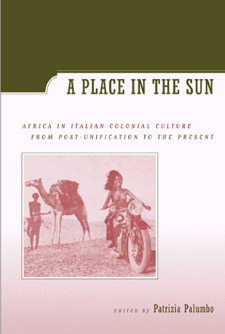 | Title: A place in the sun: Africa in Italian colonial culture from post-unification to the present Author: Palumbo, Patrizia Published: University of California Press, 2003 Subjects: History | Postcolonial Studies | European History | African History | Immigration Publisher's Description: Given the centrality of Africa to Italy's national identity, a thorough study of Italian colonial history and culture has been long overdue. Two important developments, the growth of postcolonial studies and the controversy surrounding immigration from Africa to the Italian peninsula, have made it clear that the discussion of Italy's colonial past is essential to any understanding of the history and construction of the nation. This collection, the first to gather articles by the most-respected scholars in Italian colonial studies, highlights the ways in which colonial discourse has pervaded Italian culture from the post-unification period to the present. During the Risorgimento, Africa was invoked as a limb of a proudly resuscitated Imperial Rome. During the Fascist era, imperialistic politics were crucial in shaping both domestic and international perceptions of the Italian nation. These contributors offer compelling essays on decolonization, exoticism, fascist and liberal politics, anthropology, and historiography, not to mention popular literature, feminist studies, cinema, and children's literature. Because the Italian colonial past has had huge repercussions, not only in Italy and in the former colonies but also in other countries not directly involved, scholars in many areas will welcome this broad and insightful panorama of Italian colonial culture. [brief] Similar Items |
| 10. | 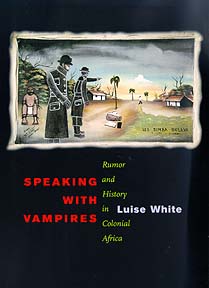 | Title: Speaking with vampires: rumor and history in colonial Africa Author: White, Luise Published: University of California Press, 2000 Subjects: African Studies | African History | African Studies | Cultural Anthropology Publisher's Description: During the colonial period, Africans told each other terrifying rumors that Africans who worked for white colonists captured unwary residents and took their blood. In colonial Tanganyika, for example, Africans were said to be captured by these agents of colonialism and hung upside down, their throats cut so their blood drained into huge buckets. In Kampala, the police were said to abduct Africans and keep them in pits, where their blood was sucked. Luise White presents and interprets vampire stories from East and Central Africa as a way of understanding the world as the storytellers did. Using gossip and rumor as historical sources in their own right, she assesses the place of such evidence, oral and written, in historical reconstruction. White conducted more than 130 interviews for this book and did research in Kenya, Uganda, and Zambia. In addition to presenting powerful, vivid stories that Africans told to describe colonial power, the book presents an original epistemological inquiry into the nature of historical truth and memory, and into their relationship to the writing of history. [brief] Similar Items |
| 11. | 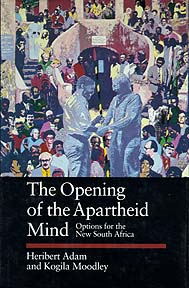 | Title: The opening of the Apartheid mind: options for the new South Africa Author: Adam, Heribert Published: University of California Press, 1993 Subjects: African Studies | Politics | African History Publisher's Description: Refusing to be governed by what is fashionable or inoffensive, Heribert Adam and Kogila Moodley frankly address the passions and rationalities that drive politics in post-apartheid South Africa. They argue that the country's quest for democracy is widely misunderstood and that public opinion abroad relies on stereotypes of violent tribalism and false colonial analogies.Adam and Moodley criticize the personality cult surrounding Nelson Mandela and the accolades accorded F. W. de Klerk. They reject the black-versus-white conflict and substitute sober analysis and strategic pragmatism for the moral outrage that typifies so much writing about South Africa. Believing that the best expression of solidarity emanates from sympathetic but candid criticism, they pose challenging questions for the African National Congress and Nelson Mandela. They give in-depth coverage to political violence, the ANC-South African Communist Party alliance, Inkatha, and other controversial topics as well.The authors do not propose a solution that will guarantee a genuinely democratic South Africa. What they offer is an understanding of the country's social conditions and political constraints, and they sketch options for both a new South Africa and a new post-Cold War foreign policy for the whole of southern Africa. The importance of this book is as immediate as today's headlines. [brief] Similar Items |
| 12. |  | Title: Crossing the line: a year in the land of apartheid Author: Finnegan, William Published: University of California Press, 1994 Subjects: African Studies | Politics | Social Problems | Autobiography | Education | African History Publisher's Description: William Finnegan's compelling account of a year spent teaching in a colored high school, "across the line," in Cape Town, South Africa brings the irrationality and injustice of apartheid into focus for the American reader. A new preface, written after the author's observation of the historic 1994 el . . . [more] Similar Items |
| 13. |  | Title: A democratic South Africa?: constitutional engineering in a divided society Author: Horowitz, Donald L Published: University of California Press, 1991 Subjects: Politics | African Studies | Sociology | Law Publisher's Description: Can a society as deeply divided as South Africa become democratic? In a most timely work, Donald L. Horowitz, author of the acclaimed Ethnic Groups in Conflict , points to the conditions that make democracy an improbable outcome in South Africa. At the same time, he identifies ways to overcome these obstacles, and he describes institutions that offer constitution makers the best chance for a democratic future.South Africa is generally considered an isolated case, a country unlike any other. Drawing on his extensive experience of racially and ethnically divided societies, however, Horowitz brings South Africa back into African and comparative politics. Experience gained in Nigeria, Botswana, Zimbabwe, and other divided societies around the world is relevant because, as South Africa leaves apartheid behind, it will still confront problems of pluralism: racial, ethnic, and ideological. Countries like South Africa, Horowitz argues, must develop institutions capable of coping with such divisions.Reviewing an array of constitutional proposals for South Africa - group rights, consociation, partition, binationalism, and an enhanced role for the judiciary - Horowitz shows that most are inappropriate for the country's problems, or else run afoul of some major ideological taboo. Institutions that are both apt and acceptable do exist, however. These are premised on the need to create incentives for accommodation across group lines. In the final chapter, Horowitz makes a major contribution to the theory of democratization as he considers how commitments to democracy might be extracted even from political groups with undemocratic objectives.Ranging skillfully across studies of social distance and stereotypes, electoral and party systems, constitutions and judiciaries, conflict and accommodation, and negotiation and democratization, Horowitz displays a broad comparative vision. His innovative study will change the way theorists and practitioners approach the task of making democracy work in difficult conditions. [brief] Similar Items |
| 14. | 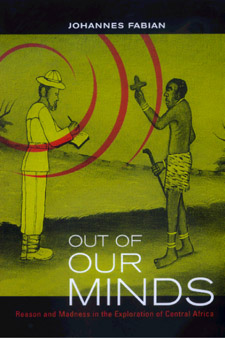 | Title: Out of our minds: reason and madness in the exploration of Central Africa: the Ad. E. Jensen lectures at the Frobenius Institut, University of Frankfurt Author: Fabian, Johannes Published: University of California Press, 2000 Subjects: Anthropology | African History | Cultural Anthropology Publisher's Description: Explorers and ethnographers in Africa during the period of colonial expansion are usually assumed to have been guided by rational aims such as the desire for scientific knowledge, fame, or financial gain. This book, the culmination of many years of research on nineteenth-century exploration in Central Africa, provides a new view of those early European explorers and their encounters with Africans. Out of Our Minds shows explorers were far from rational--often meeting their hosts in extraordinary states influenced by opiates, alcohol, sex, fever, fatigue, and violence. Johannes Fabian presents fascinating and little-known source material, and points to its implications for our understanding of the beginnings of modern colonization. At the same time, he makes an important contribution to current debates about the intellectual origins and nature of anthropological inquiry. Drawing on travel accounts--most of them Belgian and German--published between 1878 and the start of World War I, Fabian describes encounters between European travelers and the Africans they met. He argues that the loss of control experienced by these early travelers actually served to enhance cross-cultural understanding, allowing the foreigners to make sense of strange facts and customs. Fabian's provocative findings contribute to a critique of narrowly scientific or rationalistic visions of ethnography, illuminating the relationship between travel and intercultural understanding, as well as between imperialism and ethnographic knowledge. [brief] Similar Items |
| 15. |  | Title: Reclaiming America: Nike, clean air, and the new national activism Author: Shaw, Randy 1956- Published: University of California Press, 1999 Subjects: American Studies | Politics | Public Policy Publisher's Description: Have activists taken the bumper-sticker adage "Think Globally, Act Locally" too literally? Randy Shaw argues that they have, with destructive consequences for America. Since the 1970s, activist participation in national struggles has steadily given way to a nearly exclusive focus on local issues. America's political and corporate elite has succeeded in controlling the national agenda, while their adversaries - the citizen activists and organizations who spent decades building federal programs to reflect the country's progressive ideals - increasingly bypass national fights. The result has been not only the dismantling of hard-won federal programs but also the sabotaging of local agendas and community instituions by decisions made in the national arena.Shaw urges activists and their organizations to implement a "new national activism" by channeling energy from closely knit local groups into broader causes. Such activism enables locally oriented activists to shape America's future and work on national fights without traveling to Washington, D.C., but instead working in their own backyards. Focusing on the David and Goliath struggle between Nike and grassroots activists critical of the company's overseas labor practices, Shaw shows how national activism can rewrite the supposedly ironclad rules of the global economy by ensuring fair wages and decent living standards for workers at home and abroad. Similarly, the recent struggles for stronger clean air standards and new federal budget priorities demonstrate the potential grassroots national activism to overcome the corporate and moneyed interests that increasingly dictate America's future. Reclaiming America's final section describes how community-based nonprofit organizations, the media, and the Internet are critical resources for building national activism. Shaw declares that community-based groups can and must combine their service work with national grassroots advocacy. He also describes how activists can use public relations to win attention in today's sprawling media environment, and he details the movement-building potential of e-mail. All these resources are essential for activists and their organizations to reclaim America's progressive ideals. [brief] Similar Items |
| 16. |  | Title: Peasant protests and uprisings in Tokugawa Japan Author: Vlastos, Stephen 1943- Published: University of California Press, 1990 Subjects: History | Japan | Asian History Publisher's Description: The Japanese peasant has been thought of as an obedient and passive subject of the feudal ruling class. Yet Tokugawa villagers frequently engaged in unlawful and disruptive protests. Moreover, the frequency and intensity of the peasants' collective action increased markedly at the end of the Tokugawa period. Stephen Vlastos's examination of the changing patterns of peasant protest in the Fukushima area shows that peasant mobilization was restricted both ideologically and organizationally and that peasants did not become a prime moving force in the Meiji Restoration. [brief] Similar Items |
| 17. | 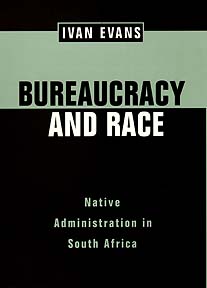 | Title: Bureaucracy and race: native administration in South Africa Author: Evans, Ivan Thomas 1957- Published: University of California Press, 1997 Subjects: African Studies | African History | Sociology | Postcolonial Studies | Cultural Anthropology Publisher's Description: Bureaucracy and Race overturns the common assumption that apartheid in South Africa was enforced only through terror and coercion. Without understating the role of violent intervention, Ivan Evans shows that apartheid was sustained by a great and ever-swelling bureaucracy. The Department of Native Affairs (DNA), which had dwindled during the last years of the segregation regime, unexpectedly revived and became the arrogant, authoritarian fortress of apartheid after 1948. The DNA was a major player in the prolonged exclusion of Africans from citizenship and the establishment of a racially repressive labor market. Exploring the connections between racial domination and bureaucratic growth in South Africa, Evans points out that the DNA's transformation of oppression into "civil administration" institutionalized and, for whites, legitimized a vast, coercive bureaucratic culture, which ensnared millions of Africans in its workings and corrupted the entire state. Evans focuses on certain features of apartheid - the pass system, the "racialization of space" in urban areas, and the cooptation of African chiefs in the Bantustans - in order to make it clear that the state's relentless administration, not its overtly repressive institutions, was the most distinctive feature of South Africa in the 1950s. All observers of South Africa past and present and of totalitarian states in general will follow with interest the story of how the Department of Native Affairs was crucial in transforming "the idea of apartheid" into a persuasive - and all too durable - practice. [brief] Similar Items |
| 18. | 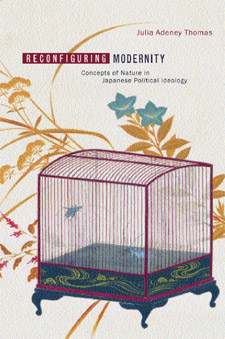 | Title: Reconfiguring modernity: concepts of nature in Japanese political ideology Author: Thomas, Julia Adeney 1958- Published: University of California Press, 2002 Subjects: History | Japan | Intellectual History | Asian History Publisher's Description: Julia Adeney Thomas turns the concept of nature into a powerful analytical lens through which to view Japanese modernity, bringing the study of both Japanese history and political modernity to a new level of clarity. She shows that nature necessarily functions as a political concept and that changing ideas of nature's political authority were central during Japan's transformation from a semifeudal world to an industrializing colonial empire. In political documents from the nineteenth to the early twentieth century, nature was redefined, moving from the universal, spatial concept of the Tokugawa period, through temporal, social Darwinian ideas of inevitable progress and competitive struggle, to a celebration of Japan as a nation uniquely in harmony with nature. The so-called traditional "Japanese love of nature" masks modern state power. Thomas's theoretically sophisticated study rejects the supposition that modernity is the ideological antithesis of nature, overcoming the determinism of the physical environment through technology and liberating denatured subjects from the chains of biology and tradition. In making "nature" available as a critical term for political analysis, this book yields new insights into prewar Japan's failure to achieve liberal democracy, as well as an alternative means of understanding modernity and the position of non-Western nations within it. [brief] Similar Items |
| 19. | 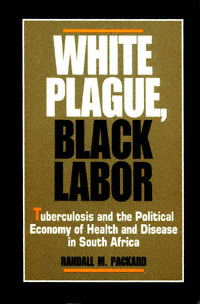 | Title: White plague, black labor: tuberculosis and the political economy of health and disease in South Africa Author: Packard, Randall M 1945- Published: University of California Press, 1989 Subjects: Anthropology | Medicine | Medical Anthropology | African Studies | Politics Publisher's Description: Why does tuberculosis, a disease which is both curable and preventable, continue to produce over 50,000 new cases a year in South Africa, primarily among blacks? In answering this question Randall Packard traces the history of one of the most devastating diseases in twentieth-century Africa, against the background of the changing political and economic forces that have shaped South African society from the end of the nineteenth century to the present. These forces have generated a growing backlog of disease among black workers and their families and at the same time have prevented the development of effective public health measures for controlling it. Packard's rich and nuanced analysis is a significant contribution to the growing body of literature on South Africa's social history as well as to the history of medicine and the political economy of health. [brief] Similar Items |
| 20. | 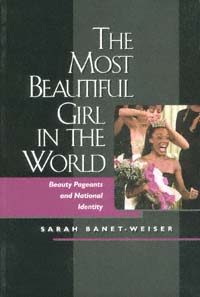 | Title: The most beautiful girl in the world: beauty pageants and national identity Author: Banet-Weiser, Sarah 1966- Published: University of California Press, 1999 Subjects: Gender Studies | Women's Studies | American Studies | Sociology Publisher's Description: Sarah Banet-Weiser complicates the standard feminist take on beauty pageants in this intriguing look at a hotly contested but enduringly popular American ritual. She focuses on the Miss America pageant in particular, considering its claim to be an accurate representation of the diversity of contemporary American women. Exploring the cultural constructions and legitimations that go on during the long process of the pageant, Banet-Weiser depicts the beauty pageant stage as a place where concerns about national identity, cultural hopes and desires, and anxieties about race and gender are crystallized and condensed. The beauty pageant, she convincingly demonstrates, is a profoundly political arena deserving of serious study.Drawing on cultural criticism, ethnographic research, and interviews with pageant participants and officials, The Most Beautiful Girl in the World illustrates how contestants invent and reinvent themselves while articulating the female body as a national body. Banet-Weiser finds that most pageants are characterized by the ambivalence of contemporary "liberal" feminism, which encourages individual achievement, self-determination, and civic responsibility, while simultaneously promoting very conventional notions of beauty. The book explores the many different aspects of the Miss America pageant, including the swimsuit, the interview, and the talent competitions. It also takes a closer look at some extraordinary Miss Americas, such as Bess Myerson, the first Jewish Miss America; Vanessa Williams, the first African American Miss America; and Heather Whitestone, the first Miss America with a disability. [brief] Similar Items |